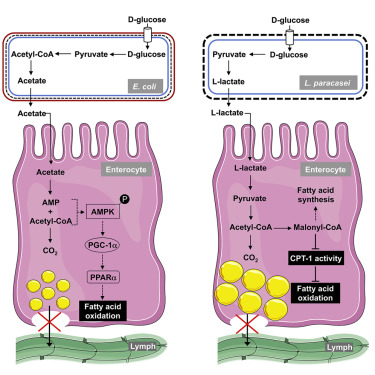当前位置:
X-MOL 学术
›
Cell Host Microbe
›
论文详情
Our official English website, www.x-mol.net, welcomes your
feedback! (Note: you will need to create a separate account there.)
Fermentation Products of Commensal Bacteria Alter Enterocyte Lipid Metabolism.
Cell Host & Microbe ( IF 20.6 ) Pub Date : 2020-02-22 , DOI: 10.1016/j.chom.2020.01.028 João R Araújo 1 , Asmaa Tazi 1 , Odile Burlen-Defranoux 2 , Sophie Vichier-Guerre 3 , Giulia Nigro 1 , Hélène Licandro 4 , Sylvie Demignot 5 , Philippe J Sansonetti 6
Cell Host & Microbe ( IF 20.6 ) Pub Date : 2020-02-22 , DOI: 10.1016/j.chom.2020.01.028 João R Araújo 1 , Asmaa Tazi 1 , Odile Burlen-Defranoux 2 , Sophie Vichier-Guerre 3 , Giulia Nigro 1 , Hélène Licandro 4 , Sylvie Demignot 5 , Philippe J Sansonetti 6
Affiliation

|
Despite the recognized capacity of the gut microbiota to regulate intestinal lipid metabolism, the role of specific commensal species remains undefined. Here, we aimed to understand the bacterial effectors and molecular mechanisms by which Lactobacillus paracasei and Escherichia coli regulate lipid metabolism in enterocytes. We show that L-lactate produced by L. paracasei inhibits chylomicron secretion from enterocytes and promotes lipid storage by a mechanism involving L-lactate absorption by enterocytes, its conversion to malonyl-CoA, and the subsequent inhibition of lipid beta-oxidation. In contrast, acetate produced by E. coli also inhibits chylomicron secretion by enterocytes but promotes lipid oxidation by a mechanism involving acetate absorption by enterocytes, its metabolism to acetyl-CoA and AMP, and the subsequent upregulation of the AMPK/PGC-1α/PPARα pathway. Our study opens perspectives for developing specific bacteria- and metabolite-based therapeutic interventions against obesity, atherosclerosis, and malnutrition by targeting lipid metabolism in enterocytes.
中文翻译:

共生细菌的发酵产物改变肠细胞脂质代谢。
尽管公认的肠道菌群具有调节肠道脂质代谢的能力,但特定共生物种的作用仍未确定。在这里,我们旨在了解副干酪乳杆菌和大肠杆菌调节肠上皮细胞脂质代谢的细菌效应子和分子机制。我们显示,由副干酪乳杆菌产生的L-乳酸抑制肠细胞分泌乳糜微粒,并通过涉及肠细胞吸收L-乳酸酯,将其转化为丙二酰-CoA以及随后抑制脂质β-氧化的机制而促进脂质存储。相比之下,大肠杆菌产生的乙酸盐还抑制肠细胞分泌乳糜微粒,但通过一种机制来促进脂质氧化,该机制涉及乙酸被肠细胞吸收,代谢为乙酰辅酶A和AMP,以及随后的AMPK /PGC-1α/PPARα途径的上调。我们的研究为开发针对肥胖,动脉粥样硬化和营养不良的特定细菌和代谢物为基础的治疗性干预措施开辟了前景,这些干预措施的目标是针对肠上皮细胞的脂质代谢。
更新日期:2020-02-25
中文翻译:

共生细菌的发酵产物改变肠细胞脂质代谢。
尽管公认的肠道菌群具有调节肠道脂质代谢的能力,但特定共生物种的作用仍未确定。在这里,我们旨在了解副干酪乳杆菌和大肠杆菌调节肠上皮细胞脂质代谢的细菌效应子和分子机制。我们显示,由副干酪乳杆菌产生的L-乳酸抑制肠细胞分泌乳糜微粒,并通过涉及肠细胞吸收L-乳酸酯,将其转化为丙二酰-CoA以及随后抑制脂质β-氧化的机制而促进脂质存储。相比之下,大肠杆菌产生的乙酸盐还抑制肠细胞分泌乳糜微粒,但通过一种机制来促进脂质氧化,该机制涉及乙酸被肠细胞吸收,代谢为乙酰辅酶A和AMP,以及随后的AMPK /PGC-1α/PPARα途径的上调。我们的研究为开发针对肥胖,动脉粥样硬化和营养不良的特定细菌和代谢物为基础的治疗性干预措施开辟了前景,这些干预措施的目标是针对肠上皮细胞的脂质代谢。











































 京公网安备 11010802027423号
京公网安备 11010802027423号